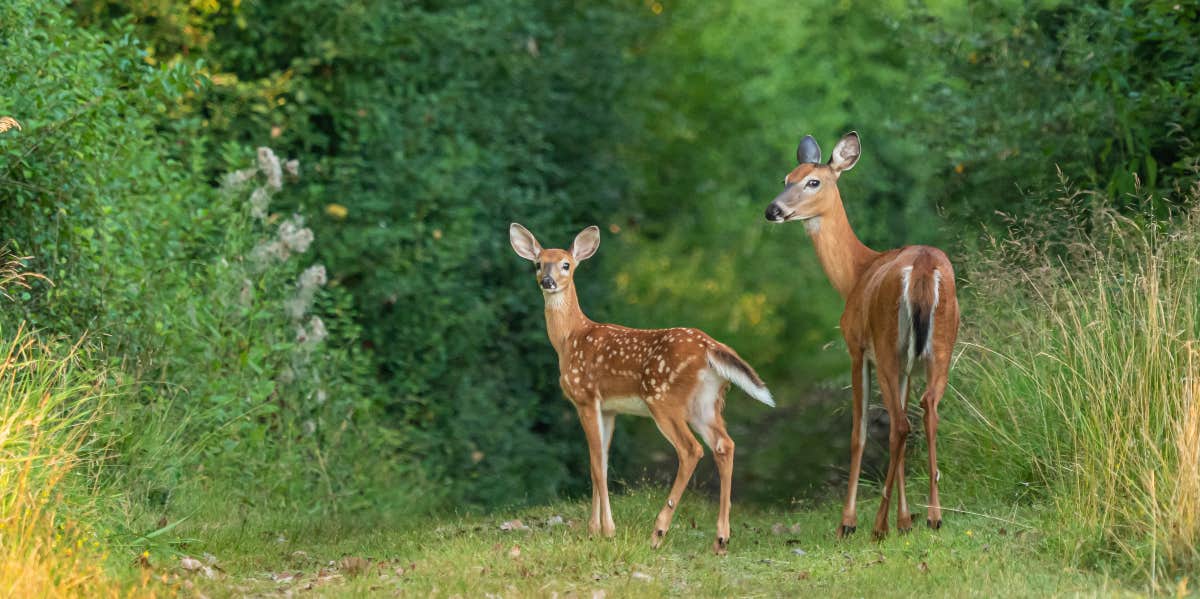Researchers Say Deer Can Carry COVID-19 — What This Means For Humans
Will we ever get rid of COVID-19?
 Pierre Williot / Shutterstock.com
Pierre Williot / Shutterstock.com Since the start of the global pandemic, scientists and researchers have been studying the effects of the SARS-CoV-2 virus in animals — including domesticated pets.
More recently, however, veterinarians at Pennsylvania State University discovered that the deer population is exploding with SARS-CoV-2 and look to see how this might affect humans.
Researchers are worried that these findings could alter the long-term course for COVID-19.
When the SARS-CoV-2 virus first emerged, there were signs that white-tailed deer could easily contract the virus since SARS-CoV-2 can bind to and enter the deer's cells.
A recent survey conducted by PNAS showed that 40% of white-tailed deer in the Northeast and Midwest regions had the antibodies against the SARS-CoV-2 virus.
Can deer spread COVID-19?
In the more recent study by the veterinarians at PSU, it appears that deer could potentially be seen as “reservoirs,” meaning that they could indefinitely hold onto the SARS-CoV-2 virus and spread it back to humans from time to time.
At least 30% of deer tested across Iowa during 2020 showed positive test results for active SARS-CoV-2 infections, further proving the viruses spread among deer in the country.
The implications that deer could become these COVID-19 “reservoirs” means that the world could lose any hope of completely eradicating the virus.
Veterinary virologist Suresh Kuchipudi at Penn State, who co-led the study, is worried that this will become the reality humanity will have to face.
"If the virus has opportunities to find an alternate host besides humans, which we would call a reservoir, that will create a safe haven where the virus can continue to circulate even if the entire human population becomes immune," he says.
"And so it becomes more and more complicated to manage or even eradicate the virus."
The deer pandemic in Iowa surged in the winter months of last year, spilling into the new year, and seeing over 80% positive infection rates among the wild animals.
Veterinary microbiologist Vivek Kapur at Penn State, who also co-led the study, said that at the peak of the surge, the prevalence of the virus in deer was effectively about 50 to 100 times the prevalence in Iowa residents at the time.
The shock and fear of this new information led them to sequence the genes of nearly 100 samples of the virus, showing consistent matches with variants spreading through people.
While the virus doesn’t appear to make the animals very sick like it does to humans, it’s still a cause for concern because of the long-term effects they’ll have on the human population.
At the moment, there is no immediate cause for concern.
Hunters should be aware of infected deer.
Scientists and researchers are studying whether or not deer can spread the virus to humans, and have announced that hunters can continue hunting and using standard precautions.
"At the moment, there’s no immediate cause for concern but justification for precaution,” Peter Rabinowitz told USA Today. “Just as we socially distance from people who could be infected, we also have to think about socially distancing from some animals who could potentially be infected."
Peter Rabinowitz is a physician who specializes in zoonotic diseases and co-directs the University of Washington Alliance for Pandemic Preparedness.
This new information shouldn’t be a cause for panic, and should be taken as a warning that this is potentially something that could affect us in the future.
Isaac Serna-Diez is a writer who focuses on entertainment and news, social justice, and politics. Follow him on Twitter here.

